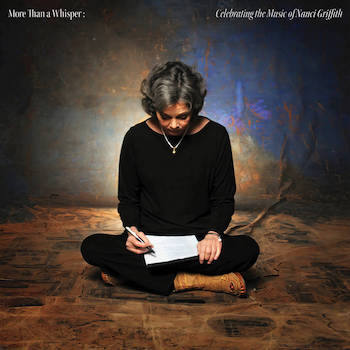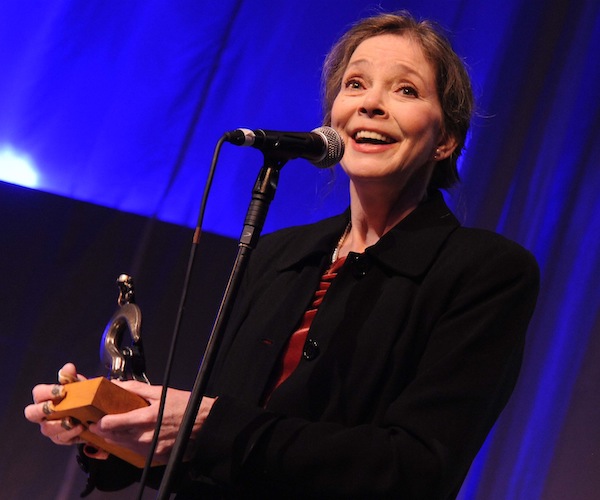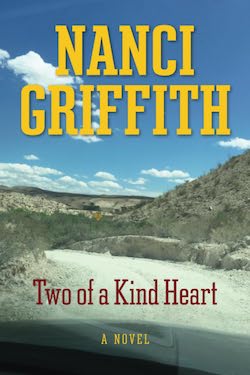Album Review: “More Than a Whisper: Celebrating the Music of Nanci Griffith” — A Flawless Tribute
By Daniel Gewertz
Love for Nanci Griffith has empowered a hell of a record.
More Than a Whisper: Celebrating the Music of Nanci Griffith (Rounder Records)
 The star-laden album dedicated to the work of Nanci Griffith is a transcendent tribute CD. With each play, More Than a Whisper: Celebrating the Music of Nanci Griffith strikes me as more expressive, more loving. Almost miraculously, the 14-song album stays true to the late singer-songwriter’s spirit, while each vocalist remains manifestly themselves. There are a dozen different producers, yet the quietly dramatic approach sounds as if it were created by a single mind.
The star-laden album dedicated to the work of Nanci Griffith is a transcendent tribute CD. With each play, More Than a Whisper: Celebrating the Music of Nanci Griffith strikes me as more expressive, more loving. Almost miraculously, the 14-song album stays true to the late singer-songwriter’s spirit, while each vocalist remains manifestly themselves. There are a dozen different producers, yet the quietly dramatic approach sounds as if it were created by a single mind.
Griffith’s longtime mentor and friend Jim Rooney not only produced three of the songs, but has also remastered Griffith’s first four albums (1978 to 1986) for a new box set titled Working in Corners, issued on the Rounder label. What’s more, he is personally putting out her unpublished novel, Two of a Kind Heart. Rooney, 85, has to be considered the cornerstone of this present period of Griffith redux, but every artist on More Than a Whisper is driven by the belief that here is a major artist whose work deserves long life. The ’80s and ’90s may have been Griffith’s creative prime, but reviving her best work is a timeless act.
The tribute album begins with Sarah Jarosz’s delicate version of an early song, “You Can’t Go Home Again.” Though she isn’t as tonally earthy as Griffith, at points Jarosz effortlessly sounds so much like Griffith it’s startling. The song — from an early, lesser known album, 1982’s Poet in My Window — contains a couplet that evokes Griffith’s complex feelings about her hometown of Austin: “This old town never did really care that much for me/ I don’t know why I always come here in my dreams.”
It is impossible to pick a single favorite here. Lyle Lovett’s and Kathy Mattea’s grievous, empowered take on “Trouble in the Fields” is every bit as masterful as Steve Earle’s “It’s a Hard Life Wherever You Go.” (Earle’s voice seems years younger and healthier than last I heard him.)
Brandy Clark’s “Gulf Coast Highway” rips one’s heart out, as does Mary Gauthier’s “More Than a Whisper.” The newer crop of talent — Aaron Lee Tasjan, Billy Strings, Molly Tuttle, Ida Mae, and The War and Treaty — are all splendid. And what a treat to hear one of the very last recordings of the late John Prine, here doing a nifty back and forth duet with Kelsey Waldon on “Love at the Five & Dime.” Somehow, his half spoken/half sung vocal exudes a warmth and body that go beyond expectations. A small miracle.

Nanci Griffith at BBC Radio 2 Folk Awards in 2010. Photo: Wiki Common
It seems everyone was on their A+ game for Nanci. One haunting highlight is “Late Night Grande Hotel,” sung by Aaron Lee Tasjan. First off, I truly thought it was a female singing. (He sings it in even a higher register than the other songs of his I sampled afterward.) The emotive level of his crystalline vocal just slayed me. Patty Griffin sings harmony. It is no disservice to the composer to say I prefer Tasjin’s version to Griffith’s. Mary Gauthier is another example of a singer who was inspired to reach a rare level of tuneful elegance. On “More Than a Whisper,” the title track of the CD, Gauthier is both steely and vulnerable. Gauthier writes the album’s eloquent liner notes but, in an inexcusable oversight, a few key words are missing from Griffith’s own description of herself. She is quoted saying she is like a “swooshed” together merging of two older musicians: (blank space) and Loretta Lynn. Luckily, the disc itself has no similar snafus.
 The instrumental highlight may be Billy Strings’s smoothly delectable acoustic guitar on “Listen to the Radio.” Molly Tuttle sings lead, and adds her own estimable guitar parts. The song is far less rollicking than Griffith’s version, which was inspired by the way a joyously blaring radio — and a perfectly timed song — can lighten the bluest of moods in an instant. In concert, and on her own album, 1989’s Storms, Griffith used the song as an exuberant change of pace. But, though the song champions music (and specifically Loretta Lynn’s tunes) because of its ability to turn depression into momentary jubilation, the song also possesses surprising depths. (For example, there is the deceptively happy sounding chorus: “When you can’t find a friend, you still got the radio.”) Though less double-edged, this new version is true to the song’s solitary soul.
The instrumental highlight may be Billy Strings’s smoothly delectable acoustic guitar on “Listen to the Radio.” Molly Tuttle sings lead, and adds her own estimable guitar parts. The song is far less rollicking than Griffith’s version, which was inspired by the way a joyously blaring radio — and a perfectly timed song — can lighten the bluest of moods in an instant. In concert, and on her own album, 1989’s Storms, Griffith used the song as an exuberant change of pace. But, though the song champions music (and specifically Loretta Lynn’s tunes) because of its ability to turn depression into momentary jubilation, the song also possesses surprising depths. (For example, there is the deceptively happy sounding chorus: “When you can’t find a friend, you still got the radio.”) Though less double-edged, this new version is true to the song’s solitary soul.
The sounds of slide guitar and pedal steel are the perfect plaintive accompaniments for Griffith’s lonesome lyricism, whether it is played by Larry Campbell, Fats Kaplan, Jon Graboff, Christopher Turpin, or the other string-benders. There is not a single weak rendition here: Iris DeMent, Todd Snider, Emmylou Harris, and especially Shawn Colvin are fully expressive even while serving up subtle interpretations. The songs were recorded in many studios, by a range of performers who all might be placed in that hard to define category known as Americana. In 2008, the Americana Music Association bestowed upon Nanci Griffith a “Lifetime Americana Trailblazer Award.” One hopes that convinced Griffith that her lifework was fully appreciated. But this recording is the more cogent compliment. She is highly respected, but the album is never hemmed in by respectability. Love for Nanci has empowered a hell of a record.
Also read Daniel Gewertz’s Music Remembrance: Singer-songwriter Nanci Griffith (1953-2021)
Daniel Gewertz has been influenced by the people he has interviewed for newspapers and radio, including jazz artists Ray Charles, Sonny Rollins, Artie Shaw, Dizzy Gillespie, Jay McShann, Gil Evans, Dave Brubeck, Keith Jarrett, Steve Swallow, J.J. Johnson and Milt Jackson; roots musicians B.B. King, Bill Monroe, Brownie McGhee, Vassar Clements, Phil Everly, Roger Miller, Carl Perkins and Bo Diddley; folkies Libba Cotton, Joan Baez, Pete Seeger, Leonard Cohen, Rambling Jack Elliot, Judy Collins, Roger McGuinn, Steve Goodman and John Prine; classic popsters Tony Bennett, Mel Torme, Eartha Kitt and Pearl Bailey; and film/theater artists Louie Malle, Edward Albee, Jeremy Irons, Glenn Close, Susan Anspach, Yul Brynner, Michael Douglas, Diahann Carroll, Jewel, Jack Klugman, and John Sayles. Daniel’s first live interview, at age 16, was with Art Garfunkel in 1966.
Tagged: Jim Rooney, More Than a Whisper: Celebrating the Music of Nanci Griffith, Nanci Griffith
